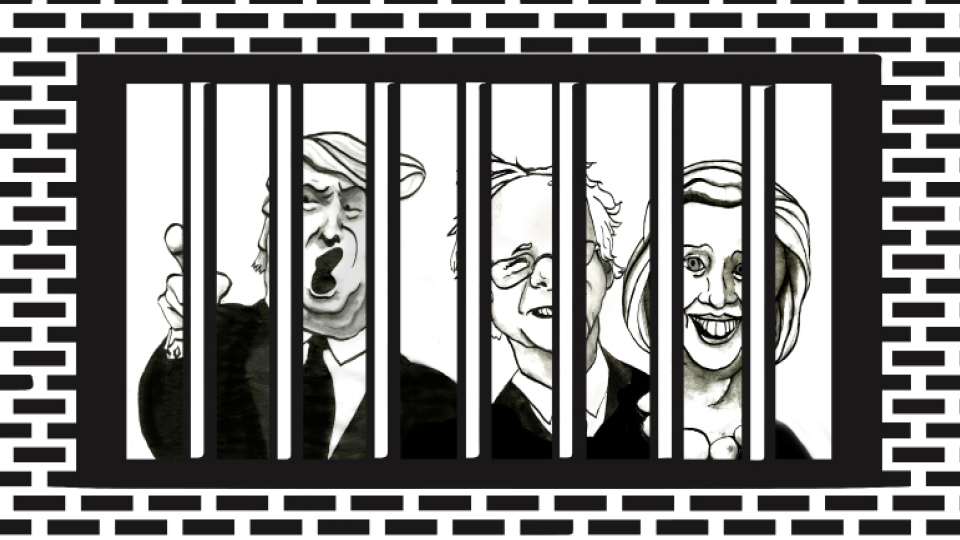Opinion
Prison problem ignored in political debates
By Caroline Harrington ’16
October 29, 2015
Following yet another debate of the presidential season, there has been a lot of questions about who won the debate, but the real question is, who lost? The real loser is an enormous underclass catalyzed by America’s prison system. Once again, the criminal justice system was not mentioned in a debate setting.
Only a handful of candidates address the need for reform on their websites, with some dedicating a mere paragraph. It’s not surprising that most candidates participating in the discussion are Democrats. Liberals have been leading the charge for prison reform for decades. Yet it is still upsetting that only two registered Republican candidates out of the pool of 15 actually mention criminal justice at all. The numbers are overwhelmingly lacking while the prison problem continues.
In the past 40 years, incarceration rates have increased immensely. According to The Sentencing Project, since the start of the War on Drugs in 1971, incarceration rates have risen from 200,000 to 2.2 million people currently in the nation’s prisons and jails. Ironically, according to statistician Marc Mauer, drug use and drug crimes have not explicitly decreased in response to these strict policy changes. With increased inmate populations , prisons see immense overcrowding and minimal funding for rehabilitative programs. Paroled and back in the outside world, recidivism is statistically highly probable, especially within low socioeconomic situations.
Thus, the policies in place are ultimately unhelpful in both preventing future crime and facilitating the reintegration of inmates back into society. The prison system is a cyclical culture where low-income neighborhoods—statistically black neighborhoods—are subject to a high risk of incarceration. It is as if incarceration is a chronic disease: inevitable and so far unpreventable.
The criminal justice issues of overcrowding, recidivism, racism in sentencing and focus on non-violent drug crimes do not only affect inmates. The entire society is impacted by outlasting effects of socioeconomic distress, felony disenfranchisements that prevent criminals the right to vote, direct familial impacts and the future of our nation through juvenile systems as well as the fates of paroled inmates reintegrated in society. As much as we try to characterize prisoners as violent others outside of society, the lives of the incarcerated population are actually not so separated from our own. The impacts of incarceration on individual families, communities and the economic and political systems as a whole are unquantifiable.
There is no debate amongst experts that reform in the criminal justice system is necessary for a number of reasons. Yet why is it that this issue has not been a part of the presidential conversation? The only candidate with extensive plans for criminal justice reform is Martin O’Malley, a name to which many respond with “who?” Third behind Hillary and Bernie, O’Malley lists lengthy ideas including re-entry programs and changes in drug sentencing.
Other candidates who at least mention the criminal justice system are Hillary Clinton (with vague statements about race), Bernie Sanders (briefly), Rand Paul (with a cute video), Chris Christie (an unpopular Republican) and Jim Webb (“who?”). Here we are confronted with one of the biggest issues in presidential races: unspecific plans and ideas. We have Democrats who barely scratch the surface of criminal justice issues to please constituents without presenting substantial ideas on how to improve the system. And across the aisle we have Republicans who largely ignore the issue.
Recently, President Barack Obama has demonstrated what a proactive president can do for prison reform. Other than being the first president to visit a prison, Obama has commuted 76 sentences for drug-related offences. He also asked Congress to send him a prison reform bill by the end of the year in order to reduce some minimum sentences. Yet even with all of these attempts at progress, debate mediators have avoided prison-themed questions. Sure the justice system isn’t as glamorous as the Iran deal and it doesn’t have a simple black and white solution like defunding Planned Parenthood. But it deserves more of a spotlight than the current overwhelming radio silence.
It is up to the presidential candidates to start this conversation as well as the public to force them to effect this necessary change.





